What to watch this weekend
Red Like Fruit, Made in Italy, A Strange Loop and Never Walk Alone are among the hot shows you need to see this weekend
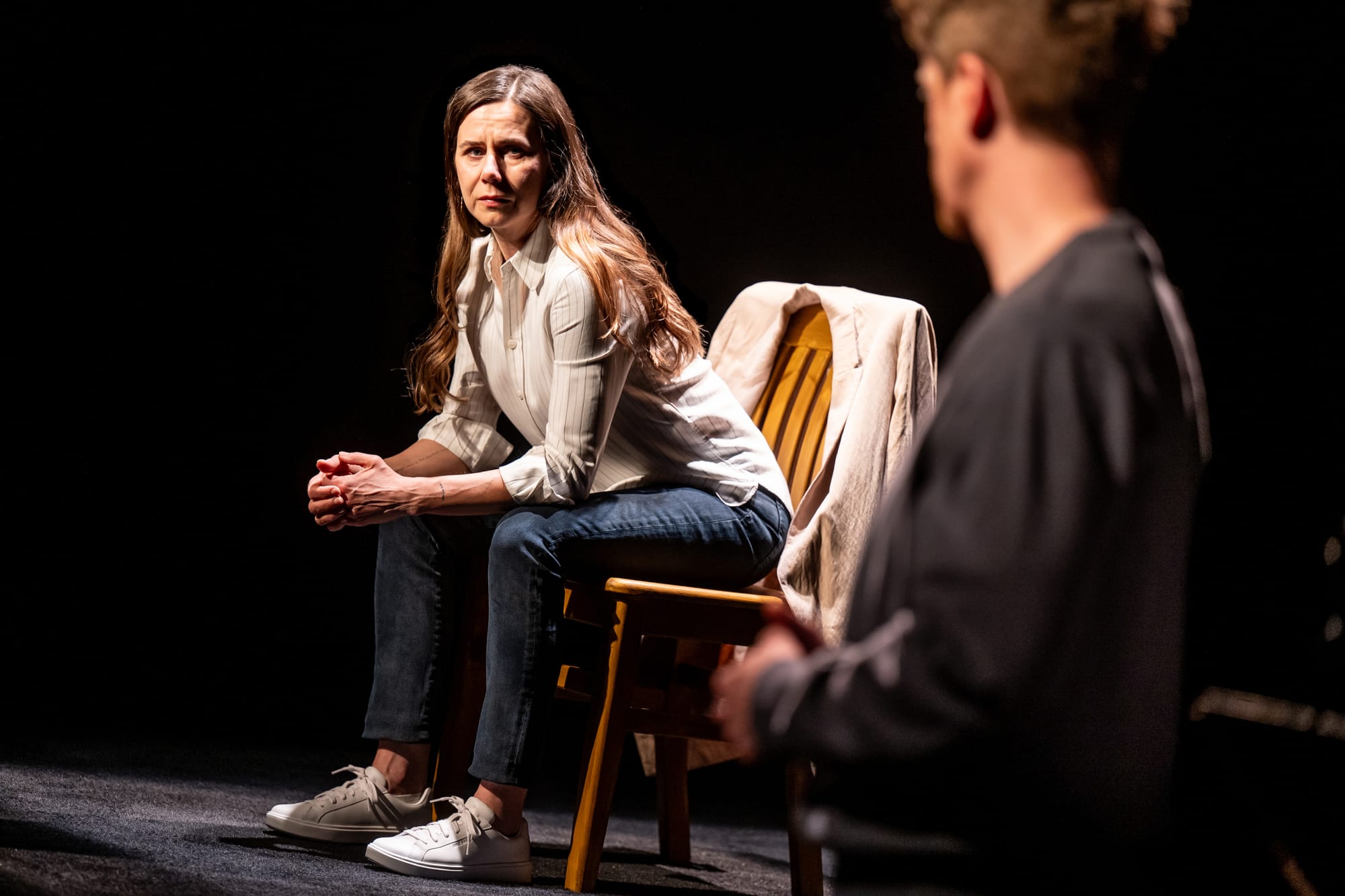
Hannah Moscovitch’s Red Like Fruit (Rating: ✭✭✭✭✭) will infuriate you. Or rather, the way Moscovitch and director Christian Barry have presented it will. And that’s all intended.
Journalist Lauren (Michelle Monteith) is working on a story about a domestic violence case, and the research and writing of the piece triggers some uncomfortable memories of her own, many of which go back to childhood.
For reasons that will remain unclear until near the end of the 80-minute play, she has decided not to tell her story herself, but has elected to have her friend Luke (David Patrick Flemming) tell it instead.
And so, as Flemming-as-Luke recites her tale downstage, a music stand propped in front of him (he rarely consults it), Lauren sits on a chair on a raised platform and listens and watches, sometimes wincing, sometimes smiling, but more often remaining neutral.
As with last season’s Dana H., another play told in an unconventional fashion, it takes a while to adjust to the show’s rhythms and presentational style, or even to understand what Moscovitch is attempting to do.
Initially, you might think she’s illustrating what has happened to women’s voices for millennia — that is, they’ve been subjected to men mansplaining things for and to them. Men have appropriated their stories, discounted or trivialized their experiences. (I can’t have been the only audience member thinking of the current Hockey Canada sexual abuse case in London, Ont.)
And certainly the way Flemming delivers the material, at first patronizing and then — as the details of Lauren’s early life begin to stack up — with more concern and empathy, bears this out.
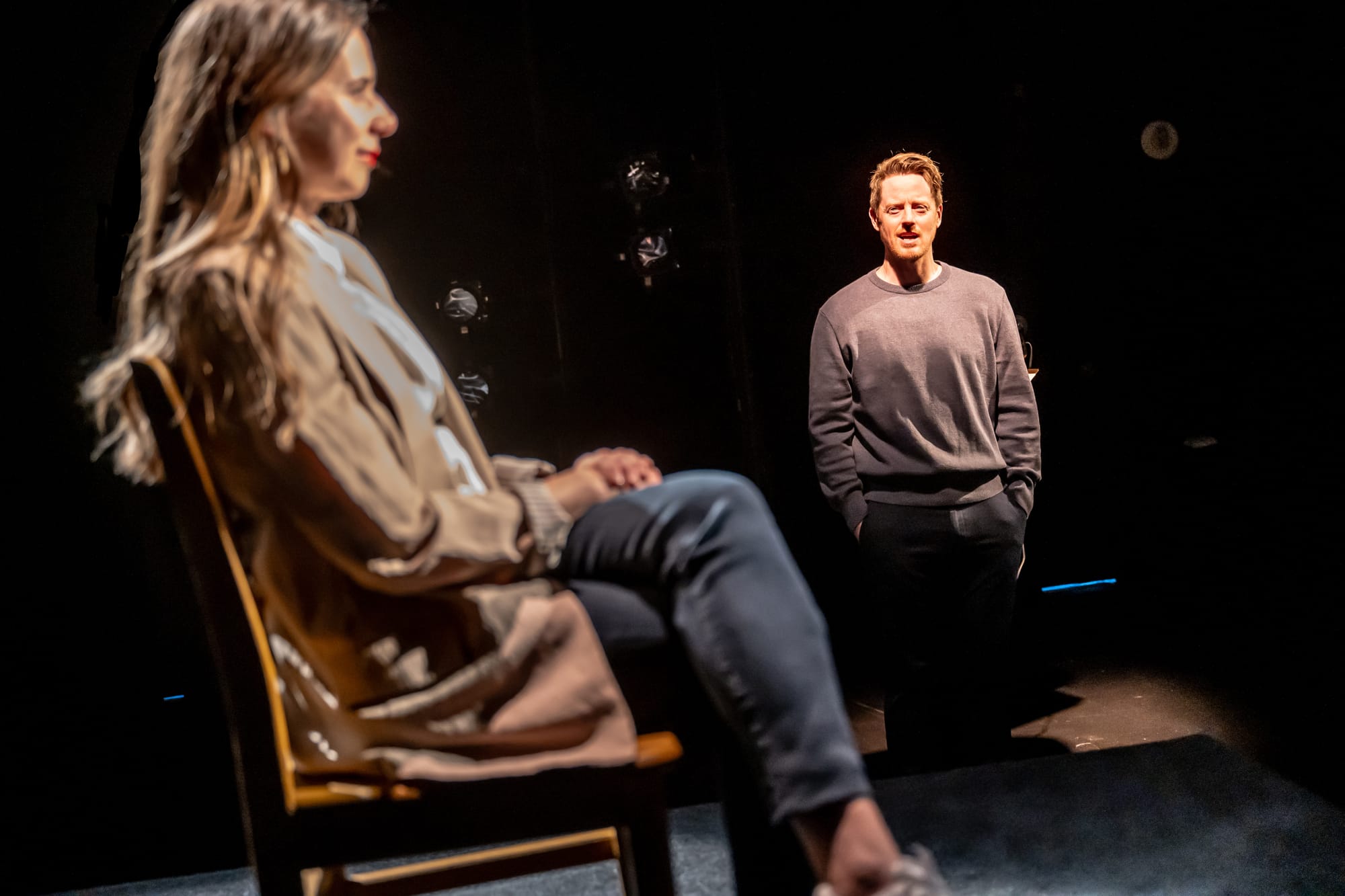
But something happens at around the 2/3 mark that is extraordinary. As Lauren interviews various people involved in the domestic violence case — among them the accused, his employer, the accuser and her mother, a neighbour — subtle details begin to emerge that affect how we consciously or subconsciously perceive things.
Similarly, Lauren’s visit to a women’s group session at CAMH, her lunch with a male colleague and her growing realization that two incidents in her childhood and youth may not have been as innocuous as she was led to believe, add to her awareness of the complex and nuanced nature of society’s attitudes towards women, sex and consent.
And when Lauren finally reveals her reasons for wanting to tell — or rather hear — her story in this particular fashion, and adds a couple of other stories involving sex as an adult, the show clicks into place. This should be required viewing for anyone who’s questioned the significance of the #MeToo or #BelieveWomen movements.
Also: if you were thinking early on that the material could have been presented as a short story, it’s here that you understand how the work lives and breathes in its aliveness — it needs to be seen and witnessed, not simply read.
Barry’s production is spare and uncluttered, with very few theatrical tricks. Or perhaps I was just unaware of them since I was so engrossed in the work’s central mystery.
It’s being presented by Soulpepper, Halifax’s 2b Theatre and the Luminato Festival, and performed in the former’s Michael Young Theatre.
I would recommend sitting as close as you can to the stage to be able to appreciate Monteith’s subtle and nuanced reactions. While Flemming does almost all of the line-readings, the pair’s occasional exchanges, and the careful way Luke tries to navigate his performance and check in with Lauren, are both telling.
Moscovitch, who currently writes mostly for TV (she’s a co-executive producer and writer on the AMC series Interview with a Vampire), has now built a body of work that rivals that of any playwright in this country, past or present. (And what a treat to see Monteith, who starred in some of her earliest works, in this. For long-time theatregoers, her presence adds yet another layer to the experience of watching this play about how the past informs the present.)
While Moscovitch’s thematic range is enormous, I think the works of hers that will last, and that will be studied for years to come, are a group of plays that deal with the complexity of women’s sexuality and freedom.
These includes What a Young Wife Ought to Know (2015), which co-starred Flemming, Bunny (2016), Secret Life of a Mother (2018) and Sexual Misconduct of the Middle Classes (2020), the latter of which was recently successfully mounted off-Broadway with Hugh Jackman and Ella Beatty (the show closes in mid-June).
Red Like Fruit, which was nominated in 2024 for the prestigious Susan Smith Blackburn Prize for a new script, and heads to Edinburgh later this summer for a run at the renowned Traverse Theatre, belongs proudly in that company.
Don’t miss it.
Red Like Fruit runs at the Young Centre for the Performing Arts until June 15. Details here.
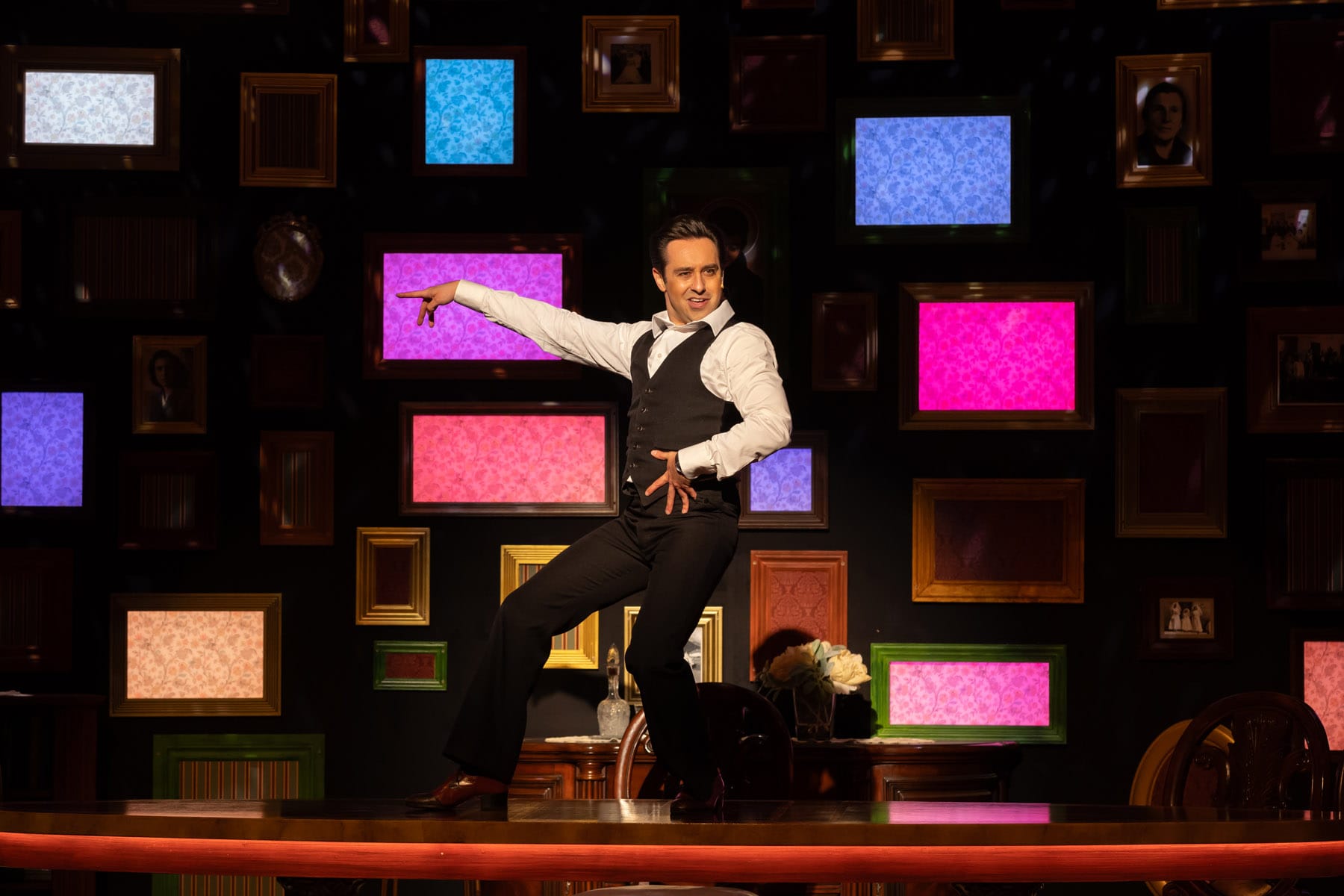
Other shows to see
• Made in Italy (extended until June 15 at the CAA Theatre)
Farren Timoteo’s solo show, Made in Italy (Rating: ✭✭✭✭), loosely inspired by his Italian immigrant father and grandfather’s experiences in Jasper, Alta. is a delicious concoction, if a little over-stuffed.
Francesco Mantini grows up in the whitebread town feeling different from his classmates. He’s forced by his father Salvatore to sing in the church choir and wear a suit to school; his lunches don’t look (or smell) like anyone else’s. He’s teased and bullied.
But a trip to the region of Italy where he was born and the popularity of Italian-American pop culture figures like Rocky Balboa give him a sense of identity and pride. Later on, when his career as a singer begins to take off, his ego swells; he anglicizes his name, denying his heritage.
Timoteo, helped by director Daryl Cloran, has cleverly structured the show to have the elder Mantini periodically address the audience about the importance of food in Italian culture. He introduces each scene by bringing in a dish or a drink.
Cory Sincennes’ set and Celeste English’s lighting work beautifully in the CAA Theatre. A back wall of frames enhances certain scenes — when Francesco shows off his Travolta-in-Saturday-Night-Fever style 70s disco moves, for instance, they light up like the dance floor in that famous film. And when, in the show’s emotional climax, Francesco acknowledges the importance of his Italian background in public, the colours in those frames light up in a way that will have you wiping away tears.
Timoteo, who’s won several acting awards out west for this performance, shifts between characters with ease. One dinner table sequence early on is a bravura bit of performancee and direction. Without resorting to caricature, Timoteo efficiently and amusingly presents each member of an extended family. He’s also an excellent singer.
I’m not sure the material warrants a 2 hours, 10 minutes run time (including intermission), however. There’s a running gag involving comments from a Catholic saint and a small-town sex worker that is amusing at the start, and tedious later on. Likewise, a scene in which Francesco visits a tailor could be trimmed.
But Timoteo is such a charismatic, engaging performer, and his story so universal in its appeal, that that doesn’t matter.
See info here. And read my interview with Timoteo here.
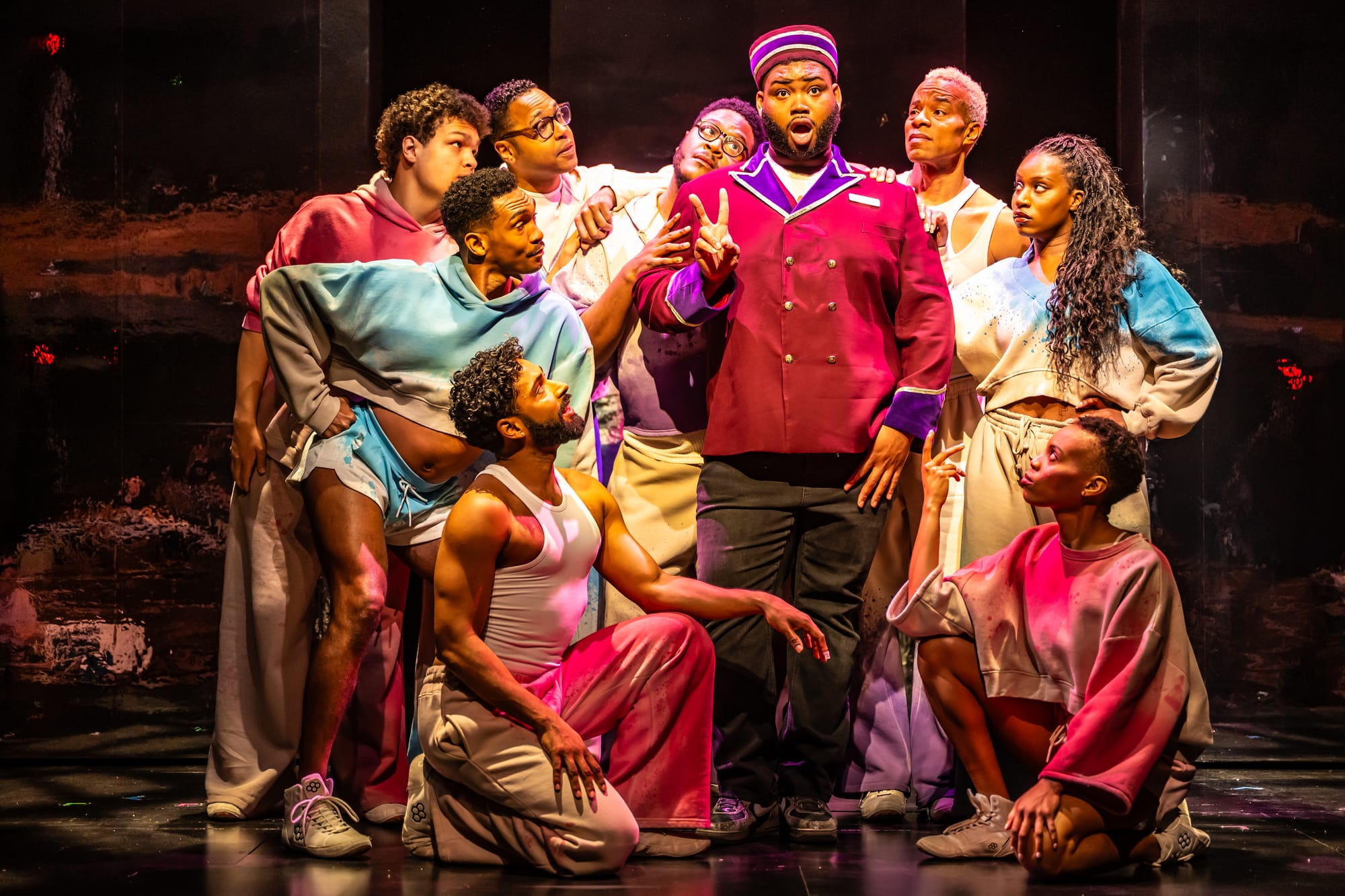
• A Strange Loop (extended until June 8 at the Young Centre for the Performing Arts)
It’s rare for a show to still be running during Toronto’s awards season. But you’ve got just over a week to catch A Strange Loop (Rating: ✭✭✭), Michael R. Jackson’s audacious and fiercely personal look at trying to make art as a big, Black, queer person. The production received lots of love at this week’s Dora Award nominations and the recent Toronto Theatre Critics Awards.
This obviously isn’t the only acclaim the show has earned; among other honours, it won the Tony Award for Best Musical back in 2022, as well as the Pulitzer Prize for Drama.
Kudos to the team of companies — the Musical Stage Company, Soulpepper, Crow’s Theatre and TOLive — who pooled their resources to produce it here. It’s a massive, important work, bristling with sharp ideas about race, sex, class and art. We are lucky to have got this show. Throughout, you get the sense that Jackson didn’t compromise on his vision. If the subject matter is a tad niche, I’d rather see something with this level of specificity and detail than the generic, focus group-approved pablum we often get in popular musicals.
That said, I still have some issues with Ray Hogg’s production. The show feels cramped on the stage of Young Centre’s Baillie Theatre, and Brian Dudkiewicz’s uninspired set — featuring cheap-looking mirror panels — doesn’t help matters. I’m not sure what Ming Wong’s costumes for the ensemble are meant to suggest — tie-dyed athletic wear? More contemporary Greek chorus robes? And the sound mix (Brian Kenny is credited as sound designer), at least on the night I saw it a few weeks ago, was off. For a show like this, with clever and often quickly sung lyrics, that’s a big no-no.
But the performances, especially from the hard-working ensemble of Inner Thoughts, are energetic and lively. And as Usher, an usher at a Disney musical who’s trying to write a musical, Malachi McCaskill, a little shaky at the beginning (at my performance, at any rate), grows in confidence and focus as his character finds his way through rejection and insecurity to acceptance and inner strength.
See info here. And read my interview with Jackson and Hogg here.
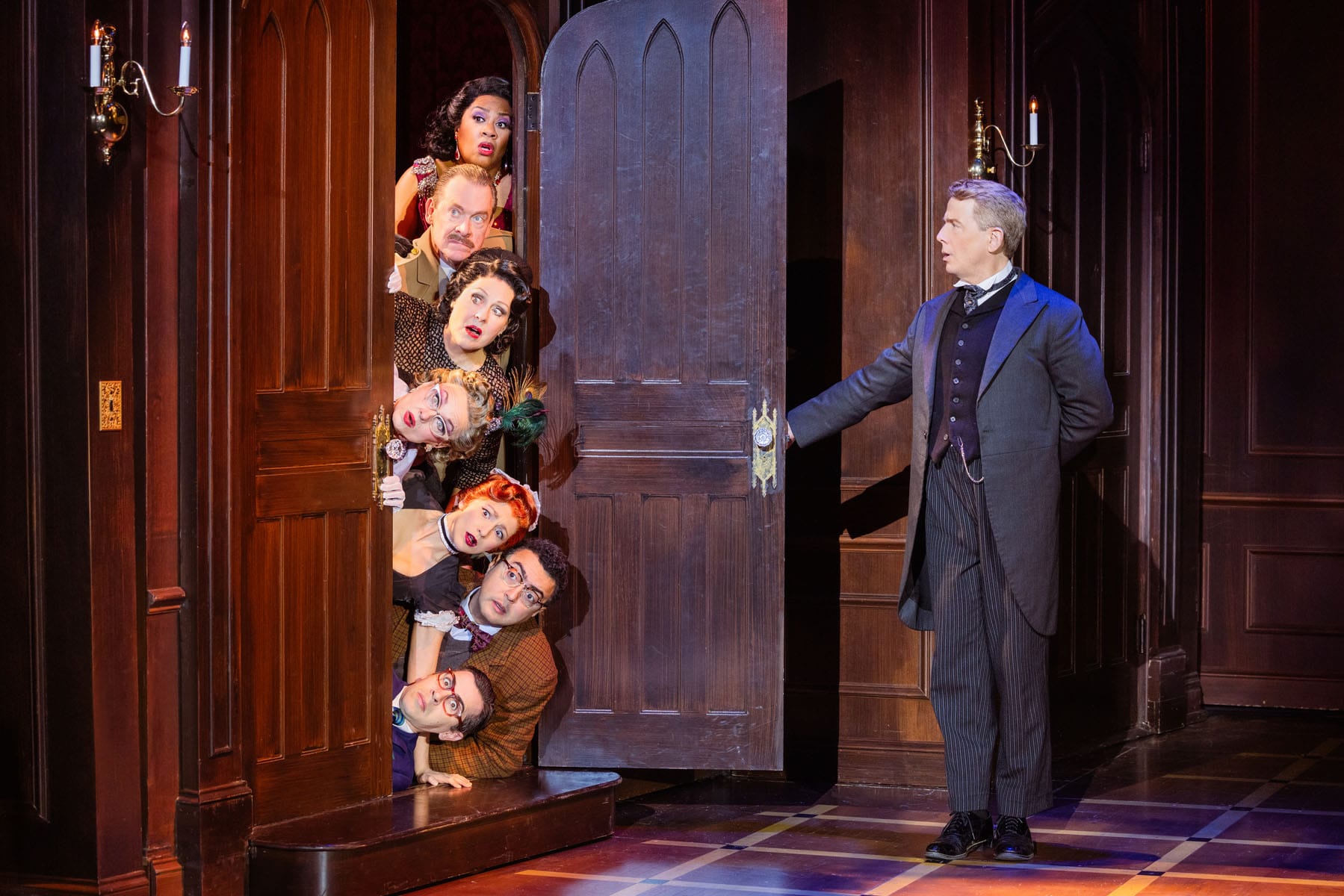
• Clue: Live on Stage! (until June 8 at the Royal Alexandra Theatre)
If you’re a fan of the 1985 film or the Parker Bros. board game it’s based on, you’ll enjoy Clue (Rating: ✭✭✭✭), a silly but very funny, well-constructed murder mystery about a series of killings in a mansion and the guests/suspects/victims involved. Writer Sandy Rustin makes fine use of the setting — Washington, D.C. during the McCarthy era — evoking a sense of paranoia and mistrust. The characters are set up quickly and efficiently, and director Casey Hushion lets them loose in Lee Savage’s brilliant, Rubik’s Cube of a set, which has plenty of revolving rooms and locked doors that can be entered in alternate ways. The actors, impeccably dressed by Jen Caprio, have great fun with the material, with especially fine work by Jeff Skowron’s butler Wadsworth, Jennifer Allen’s twitchy Mrs. Peacock and John Shartzer’s limber, nimble Mr. Green. See info here.
• Never Walk Alone (until May 31 at Buddies in Bad Times)
When I reviewed Julie Phan’s one-act play Fine China several years ago, I wrote that it was “funny, tough and insightful about guilt and regret.” You could apply all those words to her bold new piece, Never Walk Alone (Rating: ✭✭✭✭), part of Buddies’ double bill Genrefuck.
Phan plays Honey, an exotic dancer at a Montreal strip club, who finds herself working there one Christmas Eve. She’s critical of the lonely patrons’ decision to be there on that night, but perhaps in denial about why she’s there herself. Between giving lap dances, avoiding creepy customers and even running into her ex, she recounts episodes from her life.
Phan and director Tawiah M’Carthy let the play unspool at an unhurried pace, making solid use of designer Jawon Kang’s three performance areas — a pole at stage right, a bar area in the middle and a backroom for private dances. While Patrick Boivin’s video designs — projected onto a back wall — could be more evocative, Miquelon Rodriguez’s sound design feels just right, conjuring the buzz of a medium-sized crowd or the bustle of a wintry street.
Phan captures both Honey’s brittle, sarcastic surface and her more vulnerable side. And whether she’s slowly lacing up her thigh-high boots or twirling on a pole, she seems both lost in her own thoughts and aware of being watched.
The play’s narrative could be tweaked, but many scenes ring with authenticity. One note: if developed further, it might work better in a narrower playing area — the Cabaret space would be perfect, since it actually has a working bar. See info here.

Recently closed: Beyond Ken Dryden, Poz, Benevolence, and Cavalleria Rusticana
It feels like I’ve been compiling a review roundup of works dealing with personal material for months. Why?
So many shows in the first half of 2025 — Hypothetical Baby; Let’s Assume I Know Nothing, and Take it From There; A Public Display of Affection; Poz; Benevolence; A Strange Loop; Made in Italy — have tried to make art out of semi-autobiographical, or at least very personal, details. (Most of these were solo shows, so perhaps there’s a very practical reason for their existence at this time.)
I reviewed two of them above, but two of my other recent faves were Oren Safdie’s Beyond Ken Dryden (Rating: ✭✭✭✭), the author’s funny and touching look at how following the career of the Montreal Canadiens’ goalie helped him cope with the disintegration of his parents’ marriage, and Poz (Rating: ✭✭✭✭), Mark Keller’s refreshingly frank chronicle of being diagnosed with, and living with, HIV.
In both cases, the author/performers offered up details that helped give the plays the stamp of authenticity.
There must be hundreds of scripts that have chronicled a child’s growing awareness of domestic strife, but Safdie grounds his play with believable details without being too on-the-nose.
A random phone call; a picture found in a wallet; his mother’s depression. Safdie, son of renowned architect Moshe Safdie, finds a sturdy and very Canadian metaphor in his young character’s obsession with Dryden, and director Padraic Lillis and actor Max Katz help bring the story to life with heart-thumping, sweaty-palmed excitement.
Likewise, Keller brings great care and sensitivity to his story about how he received a positive HIV diagnosis in 2014 and its affect on his life. He sets up the time period well — this was after the initial wave of AIDS consciousness, when films like The Hours and Philadelphia were in cineplexes, and before the proliferation of PrEP. After a series of rejections on dating sites, he enters into his first long-term relationship in nine years, and he excavates the relationship with brutal honesty.
What gives the play structure and a sense of momentum is a fundraising bicycle ride Keller takes from Toronto to Montreal. The activity allows Keller’s persona to reflect on his past mistakes — which include drug dependency — and take stock of where he wants to be.
As the saying goes, it’s not the destination but the journey that is important here. And Keller, guided by director Nick May and supported by an impressive turn by Alan Shonfield in several roles, gives this journey heart and soul.
Poz plays the Montreal Fringe from June 9 to 14. See info here.
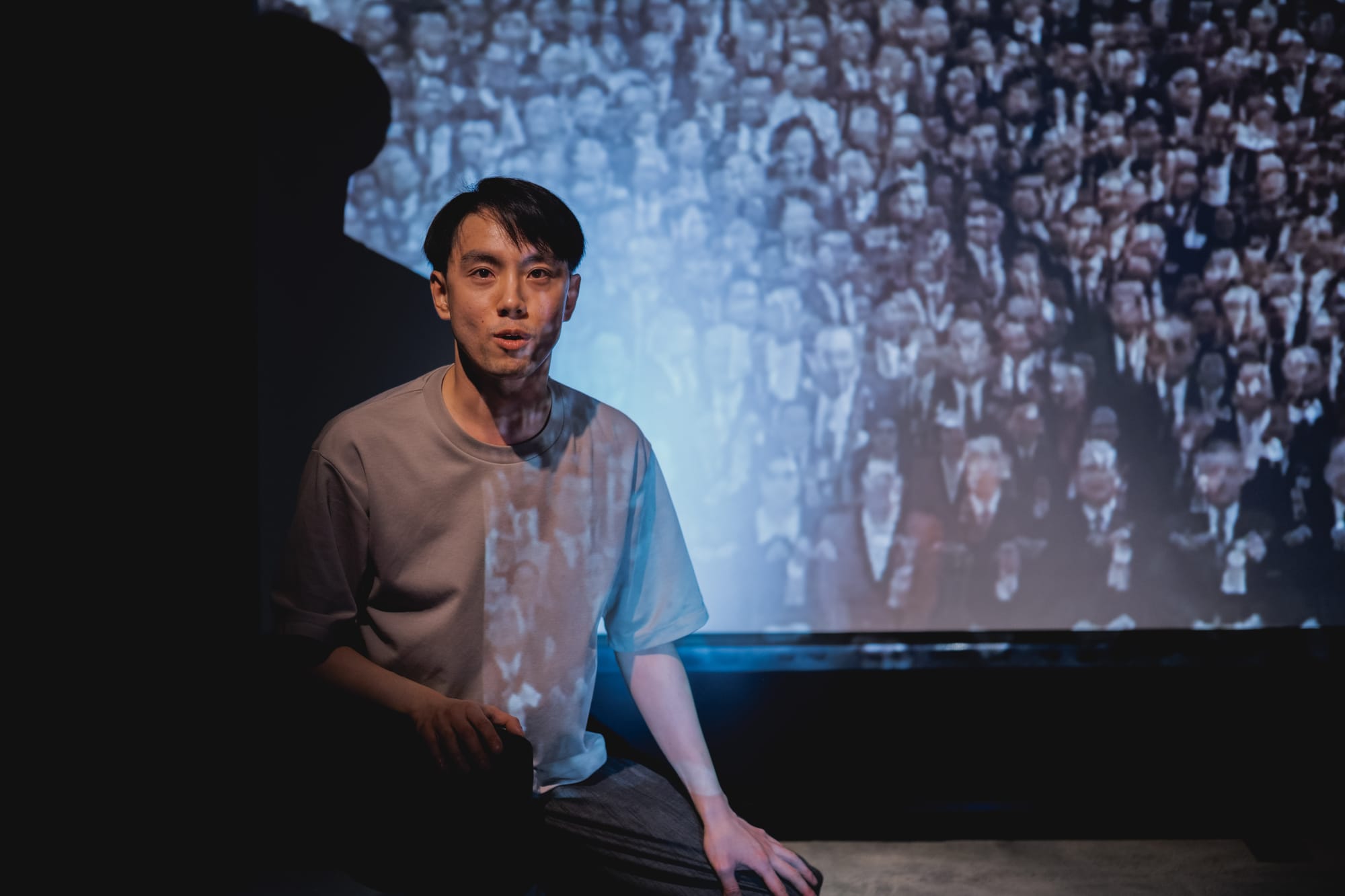
If you don’t know much about the Hakka Chinese, you’re not alone.
Even Kevin Matthew Wong, who grew up knowing he was of Hakka origin, had to question just what he knew about his background for his absorbing if underdeveloped show, Benevolence (Rating: ✭✭✭).
The multimedia performance piece originated when he received a cold call from a woman named Sonia Chin, a Hakka Chinese-Canadian from Jamaica. She had heard that Wong (The Chemical Valley Project) was a theatre artist, and she wanted him to write and direct a show put on by Hakka seniors in Markham for the world conference, attended by some 3,000 (!) people.
And so begins a journey of discovery, as he meets the various seniors and their talents and travels across Canada to meet a man who opens up the larger world of the Hakka — a nomadic people who speak their own dialect — to him.
Closer to home, he attempts to formally interview his 100-year-old grandmother, whom he remembers speaking Hakka to her friends and family when he was younger. That interview doesn’t go as planned.
Wong has a warm, sincere presence, and he’s delightfully energetic and engaging, especially at the beginning as he asks for audience participation in clanging pots and drinking tea. He’s also a nimble physical performer, as he proves at various points when he dances gracefully to help illustrate a scene. (He just received a Dora nomination for his performance.)
But much of this seems like filler. We are primed to learn more about the Hakka, but end up getting little more than a superficial glimpse. And while the design elements, including vivid projections (by Wong) and evocative sounds (by Chris Ross-Ewart), do a lot to enhance his dramatic universe, they merely make us think about the gaping hole — and the lack of authentic details — at the play’s centre.
One missing element is what Wong would have been getting financially from his commission. That kind of honest detail of is what made Rachel Cairns’ Hypothetical Baby feel so real.
When the Canadian Opera Company invited me to attend a single concert performance of Mascagni’s Cavalleria Rusticana (Rating: ✭✭✭) on May 23, I had to accept. I’m a big fan of verismo opera — roughly translated: gritty realistic opera — and the last time it was staged by the company, along with another one-act, was in 2001. This performance, in fact, was meant to honour the spirit of a COC donor who had wanted to see it return to the stage.
Here’s the thing about concert versions, however: the singers get all dressed up in gowns and tuxes — not quite the garb associated with Mascagni’s tale of love, lust and vengeance among ordinary people in a 19th century Sicilian village.
Furthermore, conductor Johannes Debus took such a leisurely, languid tempo with the score that the piece lacked drive or momentum. (I wish Speranza Scappucci or Paolo Carignani had brought their fiery conducting to the podium as they have in the past.)
Without staging, the performances felt a bit stilted, but they were well enough sung. Marjorie Owens, filling in for Anna Pirozzi, brought layers of complexity and remorse to her Santuzza, the ultimate jilted woman. As Turiddu, her lover who’s taken up with a married woman, Russell Thomas had a lovely lyrical tone, but his voice sounded strained at times. Andril Kymach brought a persuasive, relentless focus to his cuckolded and dangerous Alfio. The most impressive performance came from Queen Hezumuryango, whose physically grounded Lola was coy and flirtatious, her voice — even when offstage — giving you a clear sense of her character.
Under Sandra Horst, the COC chorus brought depth and colour to their farmers and townsfolk, although again without anything to look at except the occasional projection of the countryside or a town square, a lot of the mood was lost.
Debus and the COC orchestra did bring old-world charm and rustic simplicity to the gorgeous Intermezzo, famously used, of course, in films like Raging Bull and The Godfather III.
Here’s hoping we don’t have to wait another 20 years for Cav — or Pag, for that matter.
